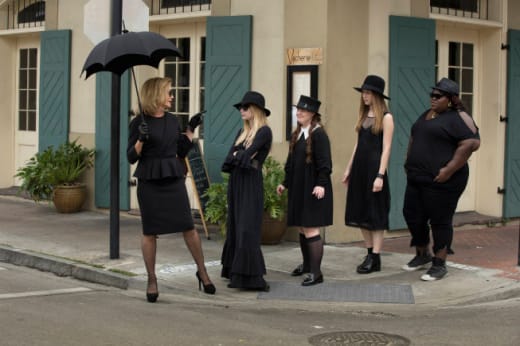The concept of the limited series swept the TV world recently, and it felt like it happened overnight.
It is not an entirely new idea, as miniseries have existed since the time of radio dramas.
However, people lost interest in them at some point, and the era seemed to come to an end.
So much so that in 1991, the Emmy Awards merged Outstanding Miniseries with Outstanding TV Movie.
After numerous name changes to the category, the concept suddenly resurged — the limited series was born.
With the popularity of American Horror Story, in 2015 they changed the category to Outstanding Limited Series.
TV Shows Should Make Stars, Not Depend On Them
But now, the idea carries almost no weight due to networks and streamers renewing the popular limited series and turning them into plain old series.
HBO is one of the biggest offenders of this, literally winning awards in the limited series category and then renewing the show that won.
And while there is some good in this practice, there is more evil below the surface.
When you see a ‘limited series,’ you expect one season and, at most, around ten episodes.
However, audiences are puzzled when that announcement for a second season comes.
Why would they do that? Well, there are a couple of different speculative reasons.
The Reasoning Behind the Renewal
One reason is that execs are scared that the show will be canceled.
Releasing it this way allows them to see how popular it is.
If it becomes a hit, they can make more seasons. If not, they don’t have to admit failure due to cancellation.
Along that same logic, it is a way to deal with viewers being unhappy when a show has a fan base but is still canceled.
No one is disappointed when the show has no second season when it wasn’t expected in the first place.
That changes entirely when there is an expectation for a sophomore run.
Two, they are purposely duping viewers, hoping you will return for more despite the story being finite from the start.
It’s exciting. Viewers tune in to see what is next. How will this plot be revived after it already came to a conclusion?
Third, they do it so they could submit for awards in the Limited Series category instead of the more crowded fields.
It’s a Trick That Could Only Work In the Era of Binge-Watching
This revolution has a lot going on. Since binge-watching has become all the rave, it makes sense since they can be finished in a night or two.
But what about long-running content?
Considering the success of long-running shows like Grey’s Anatomy, SVU, and 9-1-1, people still binge-watch those entire series.
Also, what does it say about the industry in general?
Well, we will get into all of it!
When Going Off the Rails Makes Excellent TV
The Upside of Limited Series
With a limited series, it can be easier to recruit the big names.
For example, Zoe Saldana in From Scratch, Steve Carrell in The Patient, Emma Stone and Jonah Hill in Maniac, and Kaley Cuoco in The Flight Attendant.
Then there’s the majority of actors on any White Lotus season, and, of course, Woody Harrelson and Matthew McConaughey in True Detective.
The list could go on. And yes, some the shows mentioned are not limited but were meant to be or considered so and later morphed into anthology series.
Generally, big-name actors are more willing to accept a role that does not require a long commitment period.
It’s not only actors, either. Networks and streamers are more likely to commit because they already know what they are getting into.
We also don’t have to deal with shows that go on for too long and suffer creatively.
They allow for an entire story arch without the pressure to make it go on for multiple seasons.
However, some forget that point because we have seen some horrible sophomore seasons. More on that later.
Why We Need More Mockumentary-Style Shows Like The Office & Modern Family
Fans have become weary of falling in love with a show and seeing it canceled.
Limited series ensure that neither fan nor platforms are wasting their time.
The official meaning of a limited series is that it includes shows with different stories each season, like American Horror Story.
The concept allows networks and writers to push the script and dip their toes in before jumping in, cannonball-style.
More outlandish narratives can be explored without fear of ruins.
Plus, they tend to be filmed more like movies, which brings in a more aesthetically pleasing experience.
Also, there are stories meant just to be limited series, like Inventing Anna, Griselda, and The Dropout. Some stories are short.
Amazing content like Devil in Ohio, The Haunting of Hill House, The Watcher, Maid, Painkiller, and any Harland Coben adaptation.
Then there is The Flight Attendant, Big Little Lies, The White Lotus, The Queen Gambit, When They See Us, and From Scratch.
However, with popularity comes the risk of gold turning to dust.
10 Shows to Watch if You Loved Griselda
The Negatives That Come From Limited Series
When shows that were conceptualized as limited series are renewed due to popularity, it can make for some of the worst second seasons made.
Big Little Lies Season 2 was a complete flop compared to the first, even with the addition of Meryl Streep.
The Flight Attendant’s sophomore season also paled in comparison, and the idea was even shocking to fans of the hit.
The White Lotus is an exception, although it is more like American Horror Story, where there are fresh characters and plots each season.
And then there’s 13 Reasons Why, a controversial series that, without a doubt, should’ve been one-season show.
Now The Watcher has been renewed for a second season in 2022. As a fan, it’s worrying development because the story was already told.
Those are not the only examples either.
Another downsider of limited series is that they tend to siphon funds, audiences, and talent from the film industry.
Not to mention, they are taking movies and remaking them into dreadful adaptations.
Take One Day, for example. It couldn’t compete with the 2011 film starring Anne Hathaway, which was based on David Nicholls’ book of the same name.
Classic TV Is the Perfect Binge Watch For So Many Reasons
It is a way to lure film stars into the TV world, taking their time away from making films.
I mean, Anne Hathaway was in the limited series We Crashed. I never thought that day would come, but here we are.
The thought of a 20-season TV show or a four-hour movie has become less exhausting than the oversaturated world of limited series.
Limited series have officially become tiresome, and Netflix making this an industry standard is borderline repulsive.
This is the TV world. It was never meant to provide immediate closure.
It was built to cultivate attachment, character growth, and plot depth, to form a routine, a pattern, an obsession.
What does this say about the industry? A lot.
There are tremendous attributes that separate TV from even franchise film giants — commitment and the ability to live in a different world.
Scared of commitment? It sounds like a more profound issue. After all, that’s showbiz, baby!
The Ethics of True Crime: Are Viewers Complicit In an Exploitative Enterprise?
Sure, there are cases where a limited series construct is needed.
Any crime-related retelling of a true story should be done that way.
The point of those is to show how riveting past events happened that we already know the ending to. The model was not meant to conclude in a definitive way.
But this over-infiltrated sector is too much, and the hope is that it will just be a fad and that the concept will self-implode from overcrowding.
Also, isn’t it a tad frustrating when the realization hits that you have been deceived and that limited series isn’t even limited? Not a great feeling.
Yes, astounding miniseries have been released, but beyond that and avoiding that fear of commitment, what are the long-lasting pros?
In the comments below, let us know your opinion on limited series, whether they are here to last, and what it means for the future of TV!
Eve Pierpont is a staff writer for TV Fanatic. You can follow her on X.














